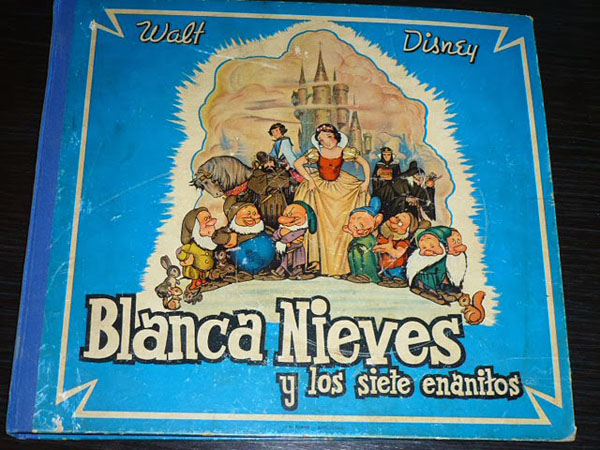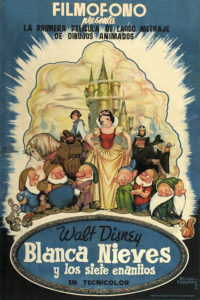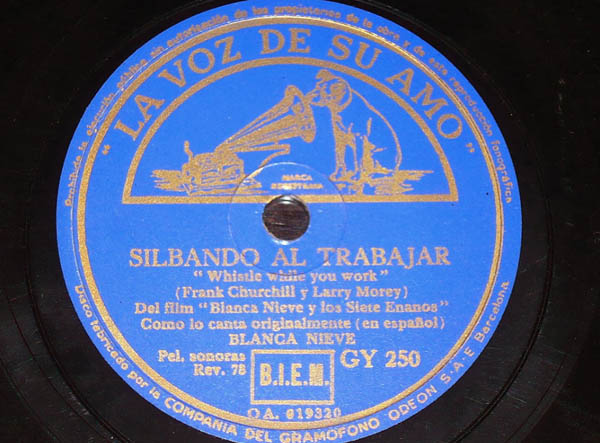
If you were asked to name a country in continental Europe where Snow White and the Seven Dwarfs might not have played in its appointed course–around late 1938 or so–you might be tempted to say Germany, or maybe Austria (which, technically, no longer existed after the forced “Anschluss” of early 1938).
You might not necessarily think of Spain.
 Yet the entire entertainment industry in Spain seems to have taken a siesta beginning with the advent of what is referred to as the Spanish Civil War. (Of course, war is seldom civil, but that hasn’t stopped people from using that term!).
Yet the entire entertainment industry in Spain seems to have taken a siesta beginning with the advent of what is referred to as the Spanish Civil War. (Of course, war is seldom civil, but that hasn’t stopped people from using that term!).
By 1938, much of the country was in the hands of the Nationalists, led by Francisco Franco. Only eastern Catalonia (in the north-east corner of the country) , and a large swath of central and southern Spain (including the capital city of Madrid) were in the hands of he left-of-center civilian government.
Of course, if one knows one’s history, one knows that Franco took complete power in 1939, and ruled as a “benevolent” (?) despot for the next thirty-six yeas.
So, what does this history have to do with “Snow White”?
At some time–presumably after the end of the Second World War–three records wee released on the Spanish equivalent of “His Master’s Voice”–known as “La Voz De Su Amo”. These three discs were dubbed from the Spanish-language soundtrack of “Blanca Nieves y los Siete Nanos”–our old and dear friend, “Snow White”.
These discs have been available on one of the major auction sites for some times–priced so as to be over the heads of most American collectors. (In Europe, record-collecting is a rich man’s hobby). Pictures of the labels of these records accompany their listing.
And these records tell the experienced collector that these discs were mastered in the United States–more secifically, at Victor’s studio in Hollywood.

Judging by these “matrix numbers”, assigned by Victor at the time the records were mastered, the session at which dubbings were made from the Spanish-language soundtrack took place in early June, 1938.
The six sides pretty much duplicate the selections found on the good-selling English-language versions mastered the previous November or December. This “Cavar, Cavar” leads into “Hai-Ho” on one side of a disc, coupled with “Una Alegre Cacion” (“With A Smile And A Song”).
Another couples “Silbando Al Trabajar” (“Whistle While You Work”) with a pairing of “Le Pido” (“I’m Wishing”) and “Un Canto” (“One Song”). Still a third couples “Me Dice El Corazon” (“Some Day My Prince Will Come”) with a Spanish translation of the “Dwarfs’ Yodel Song”.
Were these records issued here? It’s possible! If somebody has access to a catalogue of Victor’s Spanish-language records for 1939 or one of the subsequent years–or the records themselves–one might have the answer.
It just shows you that, even before Saludos Amigos and The Three Caballeros, Disney saw that there was big box-office from Mexico down to Argentina and Chile.
And if the desire for big box-office happened to coincide with the Good Neighbor Policy–well, so much the better!
Next: The German Conundrum.


 James Parten has overcome a congenital visual disability to be acknowledged as an expert on the early history of recorded sound. He has a Broadcasting Certificate (Radio Option) from Los Angeles Valley College, class of 1999. He has also been a fan of animated cartoons since childhood.
James Parten has overcome a congenital visual disability to be acknowledged as an expert on the early history of recorded sound. He has a Broadcasting Certificate (Radio Option) from Los Angeles Valley College, class of 1999. He has also been a fan of animated cartoons since childhood.












































I remember back in the 1980s there were several Spanish Language tv stations including KMEX TV 34 that had a commercial promoting several Disney read along storybooks albums in Spanish that featured the original soundtrack of each Disney animated film that came out. By the end of the commercial which showed the address to send for the read along storybook album along with the 1-800 number you can hear Snow White singing the Spanish version of “Whistle While you Work” in the background.